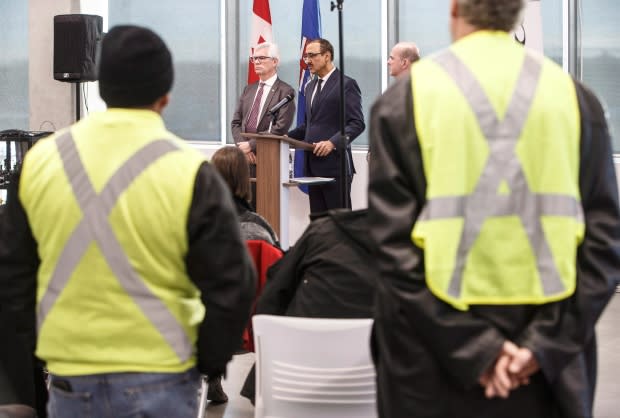Energy companies, Alberta government say Ottawa's $1.6-billion lifeline wrong solution
The federal government's $1.6-billion lifeline to Alberta's oil and gas industry is being thrown in the wrong direction and isn't enough to help struggling companies, say industry insiders after the funding announcement on Tuesday.
"It's really looking at the wrong problem," said Tristan Goodman, president of the Explorers and Producers Association of Canada, which represents small and mid-sized oil and gas companies.
"The problem actually is the market access issue. The problem isn't that our industry has problems getting its hands on capital, getting its hands on investment. The issue is, when it produces its product it needs a way to get it outside into the market, whether that be in the United States or off into the Asian economies."
Natural Resources Minister Amarjeet Sohi was in Edmonton on Tuesday to announce a suite of commercial loans to be made available to companies to develop or buy new technologies, address working capital needs, or explore new markets.
The money is available immediately, but Goodman said companies would have to go through the funding parameters to see if it could be of benefit to them.
"The issue is how this money can be utilized, and it's a bit unclear if producers can actually use this money or will want to use this money," he said.
"I think there may be some uptake on this, but my gut is that it's going to be limited. What the industry is really looking for is not for loans or grants or handouts. It's looking to do its business in a normal manner and be able to move forward."
Moving Canadian oil
Goodman said his members would have liked to have seen money put toward the purchase of rail cars to move oil and gas to tidewater.
In an interview with CBC news, Sohi said the federal government won't decide whether to help Alberta with rail capacity until the end of February, when the National Energy Board is slated to complete a review of pipeline capacity.

Energy journalist Markham Hislop said the government's announcement appears geared toward small to mid-sized companies.
"The big players have sound balance sheets and they have the financial clout that they can ride through the problem until [Enbridge] Line 3 comes on next year...it's really the [smaller] companies that are suffering," he said.
"It strikes me the federal government is trying to shore up especially the smaller producers that are having a real cash flow crunch. Companies that can't get their product to market or they're getting $5, $10, or $15 per barrel, that's really putting them behind."
'First step'
Premier Rachel Notley said she anticipates the announcement is only a "first step."
"Offering Alberta business owners and industries the opportunity to go further in debt is not any kind of long-term solution, especially not when we're talking about a province and an industry that's very good at being profitable if given the freedom to do so," she said, noting some small producers will likely benefit from the funding.
But Notley criticized the federal plan for being a "cut and paste" from similar support packages previously offered to workers in the steel, aluminum and forestry industries. In particular, she noted the federal government's promise to help companies "explore" and "expand" into new markets.
"I hate to break it to you but the whole world wants our product," she said. "The issue is not finding a market for our product, the issue getting our product to that market."
Alberta opposition leaders also criticized the package.
The issue is not finding a market for our product, the issue getting our product to that market. - Rachel Notley, Alberta Premier
Alberta Party Leader Stephen Mandel said the announcement "does nothing to actually expand market access."
UCP Leader Jason Kenney said the Liberal government should pull Bill C-69, which aims to overhaul the federal environmental assessment process, and Bill C-48, which would restrict large oil tankers on B.C.'s north coast.

Those working on the ground in the oil and gas industry are echoing the frustration over pipeline delays.
"The red tape we're fighting and the bottlenecks with this pipeline file, [whether it's to the] east, west or northwest. And the tanker ban...it's mind numbing to watch," said Kirk Grimes, of Grimes Well Servicing, which operates a fleet of service rigs in B.C. and Alberta.
"It's time for someone to be a leader and push one of these lines through, with some authority."
Grimes said he was recently in Washington state, where he saw tankers moving within a few miles of the Canadian border, after filling up at local refineries.
"They're buying our feedstock for 15 [dollars] and selling it for 50 to 60 [dollars per barrel]," he said. "Right now we have one customer and we've got to get oil out of this country."

